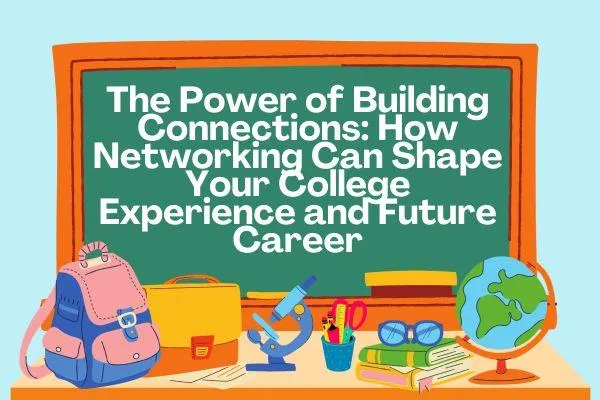My Life Tutors Blog
Learn more about our Life Tutoring services and the motivations behind our work.

The Power of Building Connections: How Networking Can Shape Your College Experience and Future Career
The Power of Building Connections: How Networking Can Shape Your College Experience and Future Career
College life is not just about attending classes and acing exams; it's also a pivotal time for building connections that can shape your future. Networking, the art of cultivating professional relationships, is a skill that can significantly impact both your college experience and your career trajectory. In this blog post, we'll delve into the importance of networking in college, explore effective strategies to connect with professors, peers, and industry professionals, and share success stories that highlight the transformative power of building connections.
The Importance of Networking in College:
1. Access to Opportunities:
Networking opens doors to a plethora of opportunities, from internships and research projects to collaborative ventures. By establishing connections, you gain access to information and opportunities that may not be readily available through traditional channels.
2. Mentorship and Guidance:
Building relationships with professors and experienced professionals provides a valuable source of mentorship and guidance. Mentors can offer insights into your field of study, career advice, and a perspective that goes beyond the classroom.
3. Diverse Perspectives:
Networking exposes you to diverse perspectives and experiences. Engaging with individuals from different backgrounds and industries broadens your horizons, fostering creativity and a more holistic understanding of your chosen field.
Strategies for Effective Networking:
1. Attend Networking Events:
Take advantage of networking events organized by your college or industry associations. Attend conferences, seminars, and workshops to meet like-minded individuals and professionals in your field.
2. Join Clubs and Organizations:
Participate in clubs and organizations related to your interests. Whether it's a student association, a coding club, or a volunteer group, these settings provide excellent opportunities to connect with peers who share your passions.
3. Engage with Professors:
Actively engage with your professors both inside and outside the classroom. Attend office hours, ask questions, and seek their advice. Professors often have extensive networks and can provide valuable insights into potential career paths.
4. Utilize Online Platforms:
Leverage professional networking platforms like LinkedIn to connect with alumni, industry professionals, and peers. Maintain a professional online presence by showcasing your skills, experiences, and aspirations.
Practical Advice:
1. Be Genuine and Authentic:
Authenticity is key in networking. Be genuine in your interactions, express sincere interest in others, and build relationships based on mutual respect.
2. Follow Up:
After making a new connection, follow up with a personalized message expressing your appreciation for the conversation. Stay in touch periodically to nurture the relationship.
3. Attend Career Fairs:
Career fairs are excellent opportunities to network with potential employers. Bring your resume, prepare an elevator pitch, and be ready to engage with representatives from various companies.
In conclusion, networking is a powerful tool that can significantly impact your college experience and set the stage for a successful future career. By actively building connections with professors, peers, and industry professionals, you not only enrich your academic journey but also create a network that can support and propel you towards your career goals. So, start networking today – your future self will thank you!
At My Life Tutors, we accommodate and scaffold
your needs to help you realize your fullest potential.
My Life Tutors
Contact us
Hours of Operation: M-F 10 am - 5 pm EST
Other times by appointment.
Copyright @2023 by My Life Tutors
Rockfield Road
Windsor Mill, MD 21244
Serving the Continental United States
My Life Tutors
Hours of Operation: M-F 10 am - 5pm EST/1PM - 8PM PST
Rockfield Road
Windsor Mill, MD 21244
Serving the Continental United States
Copyright @2023 by My Life Tutors
#ADHDCollegeCoach #CollegeSuccess #ASDCollegeCoach
#ADHD #Autism #neurodivergent
#LifeCoach #ADHDCoach #CollegeTutor #RetentionServices #ExtendedOrientationProvider #ADHDMentor #ASDMentor #LearningDifferencesCoach #CollegeTutor
